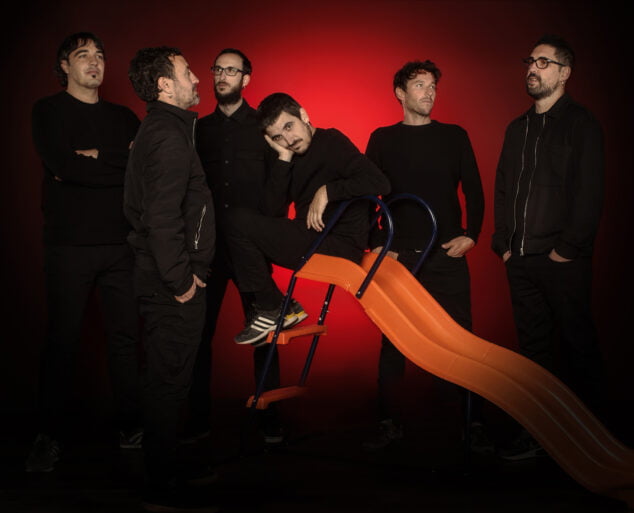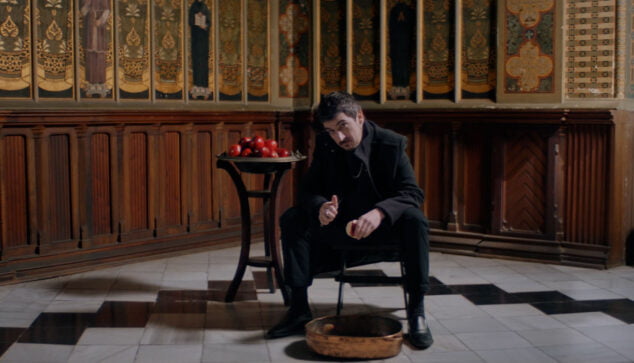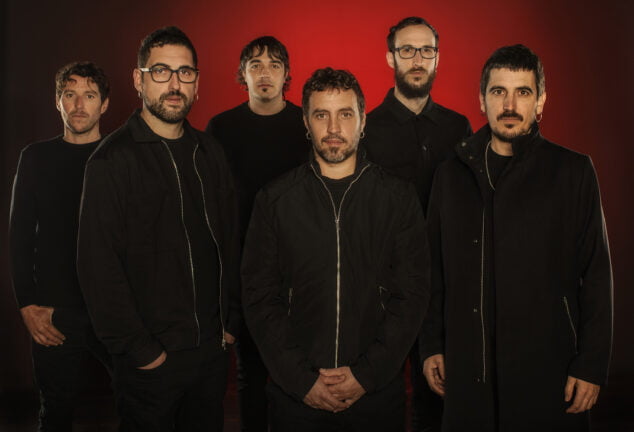The light is seen at the end of the tunnel, or that is the feeling we have regarding the pandemic. And it is not surprising, because each time our lives return to a more recognizable normality - call it new normal, If you prefer-. Especially in terms of culture, one of the sectors most affected and, nevertheless, in which we have relied the most during the worst months.
A good way to celebrate this hopeful upcoming ending is returning culture to the squares and streets. And meeting again with its protagonists, as will Dénia the next 4 July, with the concert of Zoo, one of the most important and active groups of the new Valencian scene.
During the long tour to present his latest album, llepoliesThe group the Safor will stop in Dénia to play in front of the public of the Marina, where they have thousands of followers. For that reason, we spoke with his singer, Panxo, which tells us what it's like to tour in the middle of a pandemic and how Zoo has changed after three albums.
QUESTION. You sing in Valencian and you have filled venues throughout the state, being regulars of festivals such as Viña-Rock or the most emblematic stages of Madrid. Isn't it strange that it is more difficult to see you in Valencian-speaking places, like Dénia, than in other places?
ANSWER. When we finish a tour, the balance of concerts in Catalan-speaking towns, including the Balearic Islands and Catalonia, on territories with other languages, is possibly from the 60-70%. A third part are from the Valencian territory.
We seek to dose the actions here, so as not to throw all the blame on the municipalities that do not hire us. We also we try not to saturate according to which regions. For example, MarinaSpecifically, it is an area where when we started we did about 20 concerts in a single summer.
We want there to be a certain illusion of seeing us, and not become one traveling orchestra from the Navy or wherever, because we thought that if we did that in three years, people would be extremely bored with our concerts.
Q. I was asking you because in the Marina AltaBeing a region that has served as a springboard for so many groups, the capital has stood out for a time for betting on other types of programming far from this line.
R. Really all the tourist towns program in summer for people from outside, for outsiders, so it is true that it has become more complicated to organize this type of night. Or that feeling gives me. Less annoying things are programmed, to put it bluntly.
Q. Were you surprised to be called from here?
R. Hmm ... To tell you the truth, not this year. The new album has made us call us from many places. To give examples, we touch on Zamora o Leganés for their municipalities. We are very happy, yes, and we celebrate that they dare to do those things in such tourist towns where summer is facing the outside.
I am from Gandia I know, that four or five years ago they brought Julio Iglesias and I do not know how many years it has not been scheduled rock night in Valencian. So I celebrate it.
P. The other day I saw that you were seven years old since the video clip of Summer, which is the most played video clip in Valencian history. That song was a first single, and if I remember correctly at the beginning, you were even in charge of selling the t-shirts of the song in a little stand at the foot of the stages. How have you and Zoo changed during these years, with three albums already behind you?
R. We have changed, because what we have experienced has changed us a lot and has forced us to mature and integrate many things in this new life. To me seven years ago nobody knew me, and now yes. Seven years ago I was in a very precarious economic situation, which conditioned my life a lot, and now I am lucky to be able to dedicate myself to what I like, live from this and have a relatively comfortable life. Well, a lot has changed. That both me and the rest of the group.
As a group we have also grown a lot, because we have matured, we have learned, we have known each other more ... seven years playing together.
Within all that, we have always been very clear that we wanted to be what we have always been. We didn't want to give up some convictions... Well, we did not want all the advantages that this project has given us to change us, for the worse, or to betray the education received from our parents. We have always tried to keep in mind not lose sight of the people who have surrounded us, to our friends, be careful and grateful to our people, and be very clear that what has happened to us is fortunate that one day it will end.
P. But at the moment Zoo is not over, and, as you were saying, you are doing a lot of concerts. You were recently in Catalonia playing in front of thousands of people. Is it easy to play now during the pandemic?
R. We thought it was going to be more difficult. When we were going to start the tour, seeing the theme of the seated audience and with the masks, we thought it was going to be very difficult for us, as a group, to interact like this, with an audience that can't dance and you don't know if it sings, because since they have their mouths covered ... But we have adapted very quickly. It is also true that the start coincided with a time when it seems that this is beginning to end.
In some places, like Catalunya, they are beginning to be more permissive, people being able get up from the chair, staying in place but allowing them to dance. I hope that between now and July 4 they will also stop here.
But, in essence, it is different and is not easy. It was so much easier before, when people were singing, dancing, and throwing their drinks all over themselves.
Q. I have realized that many groups, now with the pandemic, have opted to make acoustic versions of their albums or of their live shows, something that invites more, at first, to be enjoyed sitting down. Zoo pulled out the Toboggan. At no time did you think about reinventing yourself to adapt more to the possibilities?
R. Yes Yes. We think about it. Last year, when we were making the album, nothing was known about what was going to happen. It was very distressing, because we didn't know if this was forever. Many groups decided to make an acoustic format, more intimate, that allows going to pubs or houses of culture ... It went through our heads, but we immediately saw that it didn't make any sense as zoo. That if we did other projects with a different sound, but as a Zoo ...
P. Of course, the album you have released is just as festive as ever. Or at least I see it that way.
R. Yes, we said that if we went, we went with everyone and that's it. And if we can't play afterwards or we have to wait six months, then we wait.
On top of that, the album was very advanced. And we said: man, this is what has gone well for us and we are going to get it out. If afterwards we have to bother each other, well. Like last year there were so many groups that they had to screw up, we were not going to be the most unfortunate, but we would be one more who ate the brown.
P. But you have done well, because you are one of the most active groups right now. People respond, right? Or do you notice that there is a certain audience that still prefers to wait to go to a concert?
R. Some message we have ever received, but in every concert we have given all tickets have been sold. We can't complain, it's going very well.
People really want to go to concerts even if they are sitting down, because many have been a year without being able to go to any. And they can no longer.
There is also a very nice thing, or I have that feeling, and it is that many people have become aware of the importance of helping and supporting culture. Before, people didn't think so much that to release an album, for example, you had to make a brutal investment of time, energy and money. With everything from the pandemic The discourse that this has a cost and moves many working people was very well articulated. I think a lot of people got it and now they gladly pay a ticket, saying "these people have had a really bad time and I don't feel like spending 15 bucks on a ticket."
Q. Anyway, there will be 2.000 people waiting to see you in what used to be Festivities of the Most Holy Sang and now they have been renamed Festiu 2021, because the situation prevents the celebration of most religious acts, as well as others such as els Bous a la Mar. Therefore, this year's programming is practically all focused on cultural performances. Knowing this, do you think that the restrictions have brought, in a way, something good?
R. Man, don't celebrate them Bous a la Mar because of the restrictions ... well I celebrate it (laughs). I mean, I think it's a good thing.
As you have told me, I see it very well redirected, to culture, and I wish more municipalities would do the same. What happens, and I have to say it even if it might be to throw stones at me, is that Certain cultural events, as they were planned before the pandemic, cannot be done either, because they are not safe. It's okay to redirect it to the culture, and reinvent the culture a bit too because, well, we're in a pandemic! We have to realize it and know how to be responsible.
P. But it seems that, little by little, everything is improving and the end is already closer. When it's all over, how are you going to celebrate?
R. Making a party with friends, that we can be all day, be 30 or 40, without being afraid and without being grated in case I drink from your glass, or we hug or kiss. I'm going to celebrate it like everything else in my life, in a simple way. You will not see me in a bullfight or a procession, I will make a good paella with my friends.
And if it can be, do a concert where people can pogo, dance and hug.










Yes, thanks to the Pandemic, people read more and are interested in having more knowledge about various topics, it is noticeable in the conversations that the level has risen considerably, hahahaha